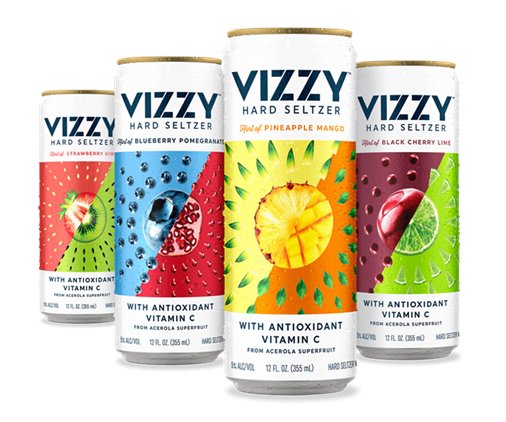Hard seltzer is in vogue and it is easy to see why. This carbonated, flavored, low-alcohol drink is highly delectable. The alcohol contained in hard seltzer is typically made from fermented sugar, but it can also be made from fermented barley malt. Hard seltzers contain 4.5-7% alcohol by volume (ABV).
Advantages of Hard Seltzer Over Wine, Beer, Liquor and Cocktails
There are certain health advantages in choosing hard seltzer over wine, beer, liquor or cocktails. Hard seltzer has less calories and carbs than other alcoholic beverages. For instance, a serving of wine, beer, liquor, or cocktails will range from 100 to 400 calories. One serving of hard seltzer, yields 100 calories or less. Also, because the alcohol in hard seltzer is usually from fermented sugar, it is naturally gluten free.
These benefits were noted by Ginger Hultin, registered dietitian with the Academy of Nutrition and Dietetics and owner of Champagne Nutrition. In a USA Today article, she accentuated the calorie and carb differences that exist between hard seltzer and beer and added, “One potential benefit of a hard seltzer is that they often don’t have a high amount of added sugar. If you compare that to a cocktail made with regular cola/soda, juice or simple syrup, it could be a lower-sugar option.”
The Convenience Factor of Hard Seltzers
Hard seltzer is also more convenient to buy. Because of its low alcohol content, it can be sold in supermarkets and grocery stores and purchased anytime. In a Nielsen survey, over fifty percent of consumers said they chose ready to drink beverages because of the convenience. Quick accessibility makes it especially attractive.
More Flavor Experimentation is Possible with Hard Seltzers
Hard seltzer lends itself to experimenting with natural flavors. The flavors enhance the carbonated water and alcohol combination. Such use of flavors cannot be as readily done with other alcoholic beverages. This appeal of flavors was written about in a Chicago Tribune article. Josh Noel, a writer for the Tribune, who covers the beer industry, gave an overview of the hard seltzer market. He said, “People like flavor and they like diversity, and they like both those things in their hard seltzer.”
The Hard Seltzer Market
The hard seltzer market is growing exponentially. For example, Nielsen notes that in the past two years the number of brands in the market increased five-fold. In terms of dollar growth, there are also major shifts upward. Nielsen documented a sharp rise in revenue ($900 million) in 2020 over 2019, with sales for the year ending in June 2020 totaling $2.7 billion. The International Wine and Spirit Research body (IWSR), forecasts that by 2023 the industry will triple (to 281 million cases). Spirits business.com forecasts that the hard seltzer market will be worth $17 billion by 2027.
Molson Coors Unveils Two OU Kosher-Certified Hard Seltzer Brands

Molson Coors Vizzy brand. Flavors include Strawberry Kiwi, Blueberry Pomegranate, Pineapple Mango and Black Cherry Lime.
Recently, Molson Coors introduced two hard seltzer brands that are both OU kosher certified. The first brand, Vizzy, changed the dynamic of the hard seltzer market. Unlike all of the other hard seltzers on the market, Molson Coors utilized acerola, a superfood with the high levels of Vitamin C. Vitamin C, a powerful antioxidant, helps boost the immune system and provide extra energy. All hard seltzers under this brand are gluten free, 100 calories and are only 5% alcohol by volume.
The second brand introduced by Molson Coors is Coors Seltzer. Not only does it showcase new flavors, but it has an environmental goal, to restore American rivers. As the website notes, “ For each 12-pack of Coors Seltzer you purchase, it helps us restore 500 gallons of fresh water to our rivers.” Matt Escalante, Molson Coors’ senior director of above premium flavors, said, “With the launch of Coors Seltzer and its Volunteer Program, we’re setting out to provide a seltzer that tastes good and also gives drinkers an opportunity to do good with each and every sip.”
Conclusion
Hard seltzer has arrived, and it is enjoying enormous growth. It offers health benefits, convenience and flavor in a market that is rapidly expanding. Molson Coors has introduced two unique brands to the kosher market and revolutionized the industry by putting an emphasis on nutrition and spearheading a corporate program that is replenishing nature “one drink at a time.”






